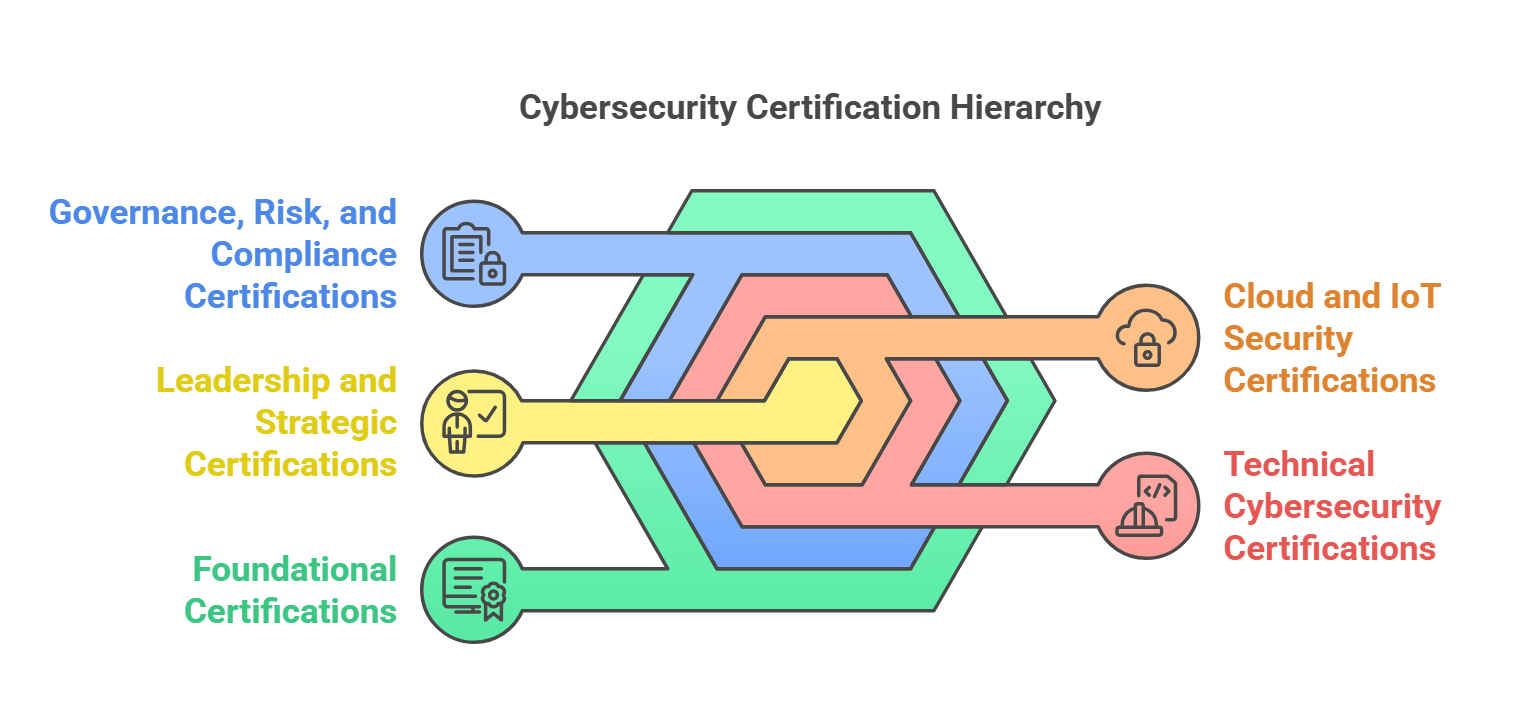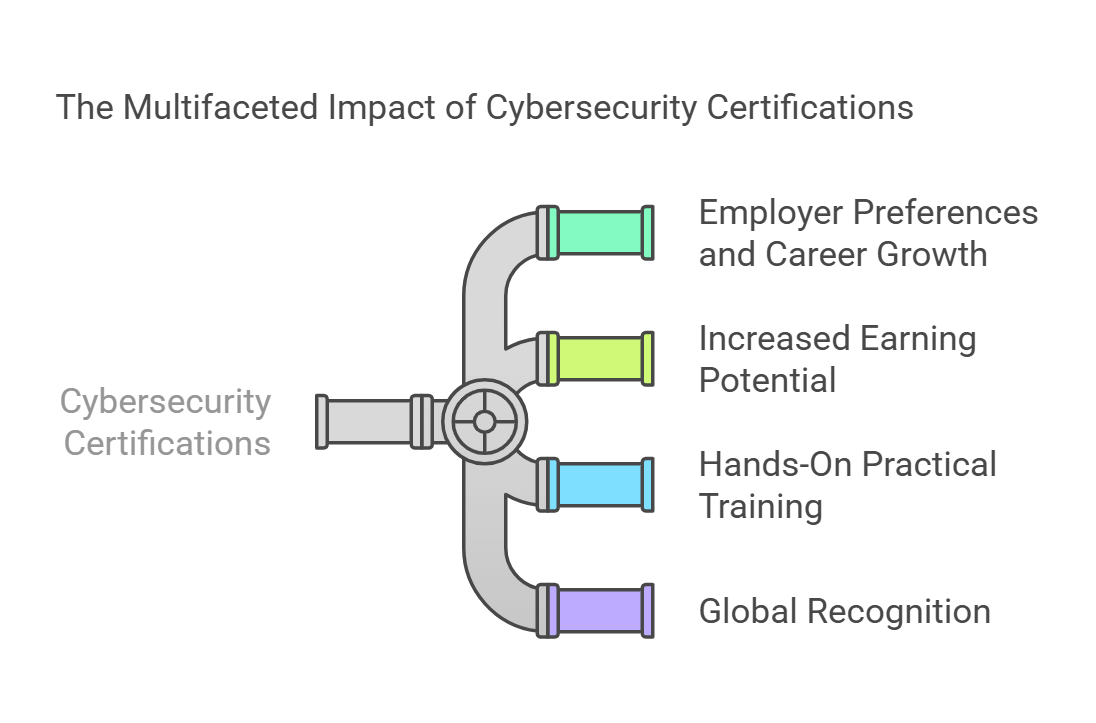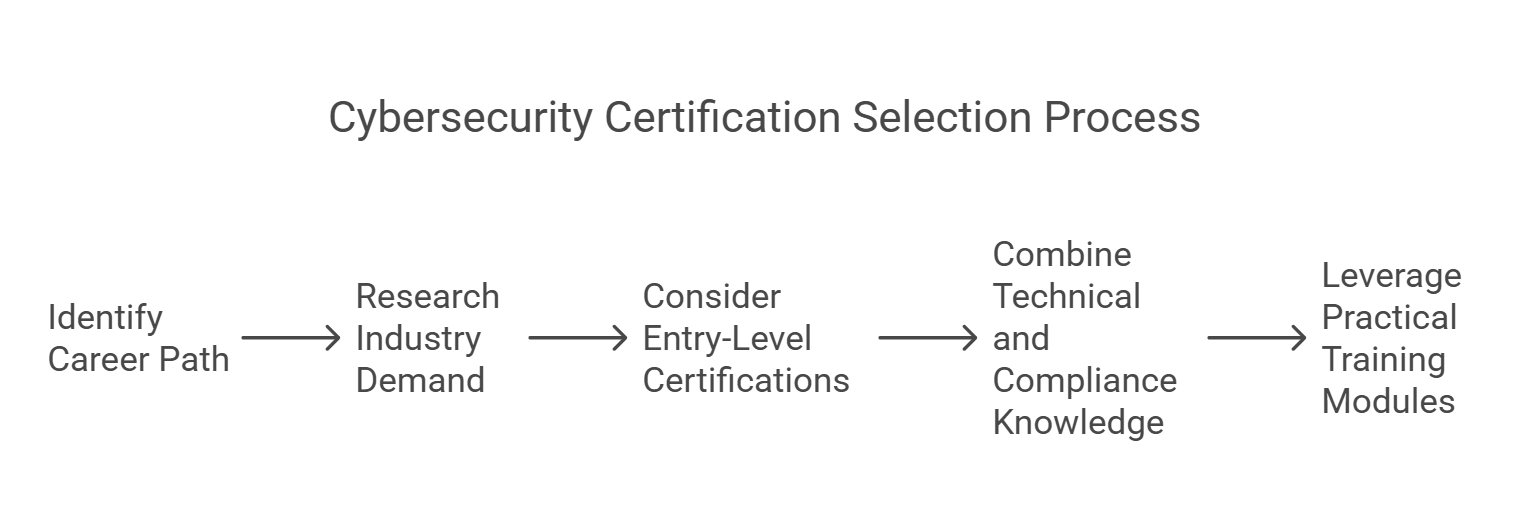Table of Contents
- The Expanding Cybersecurity Certification Landscape in 2025
- Why Cybersecurity Certifications Matter More Than Ever
- New and Emerging Certification Trends in 2025
- Key Cybersecurity Certification Categories
- Why Cybersecurity Certifications Matter in 2025
- How to Choose the Right Cybersecurity Certification
- FAQs About the Cybersecurity Certification Landscape in 2025
- Final Thoughts
Cybersecurity is no longer just an IT concern—it’s a global priority. Master Cyber Skills with the right certifications to stay ahead in this evolving industry. As cyber threats become more sophisticated, organizations are investing heavily in skilled professionals to safeguard sensitive data. The cybersecurity certification landscape in 2025 continues to evolve, offering a wide range of programs that validate expertise in cloud security, ethical hacking, compliance, and emerging technologies. Google and other leading organizations recognize the importance of staying credentialed in this field.
With increasing regulatory demands and growing security risks, certifications have become essential for career advancement in cybersecurity. Whether you're entering the field or looking to specialize, understanding the current certification ecosystem is crucial.
The Expanding Cybersecurity Certification Landscape in 2025
Why Cybersecurity Certifications Matter More Than Ever
The demand for cybersecurity professionals is skyrocketing, with a global talent gap exceeding 3.5 million unfilled positions. Certifications not only validate expertise but also demonstrate a commitment to staying updated in a rapidly changing field. As of 2025, employers increasingly prioritize credentialed professionals who can mitigate risks in cloud computing, artificial intelligence (AI) security, and zero-trust frameworks.
New and Emerging Certification Trends in 2025
The cybersecurity certification landscape is expanding to cover:
-
AI and Machine Learning Security – Protecting AI-driven systems from adversarial attacks.
-
Zero-Trust Security Certification – Validating expertise in zero-trust architecture.
-
Blockchain and Cryptocurrency Security – Addressing vulnerabilities in digital assets.
-
Cloud-Native Security – Certifications focusing on serverless and Kubernetes security.
Key Cybersecurity Certification Categories

1. Foundational Certifications
For beginners and those transitioning into cybersecurity, these certifications focus on fundamental security principles, network protection, and risk management.
-
Example: CompTIA Security+
-
Best for: Entry-level professionals, IT personnel transitioning to cybersecurity, fresh graduates.
2. Governance, Risk, and Compliance (GRC) Certifications
Organizations face growing regulatory scrutiny, making compliance-focused certifications essential for professionals in risk management and policy development.
-
Example: ISACA’s CRISC (Certified in Risk and Information Systems Control)
-
Best for: Compliance officers, auditors, governance professionals.
3. Technical Cybersecurity Certifications
These certifications validate specialized technical skills, including penetration testing, network security, and ethical hacking.
-
Examples:
-
Certified Ethical Hacker (CEH)
-
Cisco Certified CyberOps Associate
-
-
Best for: Security analysts, penetration testers, red and blue team professionals.
4. Cloud and IoT Security Certifications
With cloud adoption accelerating, organizations require professionals who can secure cloud environments and IoT infrastructures.
-
Examples:
-
AWS Certified Security Specialty
-
CompTIA Cloud+
-
-
Best for: Cloud engineers, IoT security specialists, DevSecOps professionals.
5. Leadership and Strategic Certifications
For experienced professionals looking to step into leadership roles, strategic certifications help develop skills in security management and executive decision-making.
-
Examples:
-
Certified Information Systems Security Manager (CISM)
-
Certified Chief Information Security Officer (CCISO)
-
-
Best for: CISOs, security managers, IT directors.
Why Cybersecurity Certifications Matter in 2025

1. Employer Preferences and Career Growth
Cybersecurity certifications are becoming mandatory for key roles such as Cybersecurity Analyst, Penetration Tester, and Risk Manager. Recruiters look for credentialed professionals who can demonstrate real-world expertise in preventing cyber threats.
2. Increased Earning Potential
Certifications significantly impact salaries. In 2025, certified professionals earn up to 25% more than their non-certified counterparts. Advanced credentials like CISSP (Certified Information Systems Security Professional) and CCSP (Certified Cloud Security Professional) unlock higher salary brackets.
3. Hands-On Practical Training
Certifications are evolving to emphasize hands-on skills. Programs now integrate real-world cybersecurity simulations, threat hunting exercises, and cloud security labs to ensure professionals are job-ready.
4. Global Recognition
Certifications aligned with NIST, GDPR, ISO 27001, and SOC 2 compliance frameworks ensure global recognition. Whether working in the U.S., Europe, or emerging markets, certified professionals enjoy better career prospects.
How to Choose the Right Cybersecurity Certification

Step 1 – Identify Your Career Path
Consider your professional goals—whether you’re inclined toward penetration testing, compliance auditing, or cloud security.
Step 2 – Research Industry Demand
Look for certifications that align with in-demand cybersecurity roles. For example:
-
CISM or CRISC for governance and compliance.
-
OSCP (Offensive Security Certified Professional) for ethical hacking.
-
AWS Security or Azure Security Engineer for cloud security.
Step 3 – Start with a Strong Foundation
Beginners should consider entry-level certifications like CompTIA Security+ before advancing to specialized programs.
Step 4 – Combine Technical and Compliance Knowledge
Balancing technical expertise (e.g., network security) with compliance certifications (e.g., CISM, CRISC) makes professionals more competitive in the job market.
Step 5 – Leverage Practical Training Modules
Hands-on labs and interactive simulations, such as those offered by ACSMI, enhance theoretical knowledge and bridge the gap between certification and real-world application.
FAQs About the Cybersecurity Certification Landscape in 2025
1. What are the top cybersecurity certifications in 2025?
Certifications like CISSP, CEH, AWS Security Specialty, and CRISC continue to be in high demand. New certifications focusing on AI security, blockchain security, and zero-trust frameworks are also gaining traction.
2. How do I select the right certification?
Evaluate your experience level and career goals. Beginners should start with CompTIA Security+, while advanced professionals can pursue CISSP or CISM.
3. Do cybersecurity certifications expire?
Yes, most certifications require renewal every three years. Professionals must complete Continuing Professional Education (CPE) credits to maintain their credentials.
4. Are cybersecurity certifications worth it?
Absolutely. Certifications improve employability, increase earning potential, and provide hands-on skills required to tackle real-world security challenges.
5. How long does it take to earn a cybersecurity certification?
Timelines vary. Entry-level certifications take 2-6 months, while advanced certifications like CISSP require years of experience plus rigorous exam preparation.
Final Thoughts
The cybersecurity certification landscape in 2025 is more dynamic than ever, reflecting the rapid evolution of cyber threats and technological advancements. Whether you're a beginner exploring foundational certifications or an experienced professional aiming for leadership roles, investing in the right cybersecurity credentials can open doors to high-paying, globally recognized opportunities.
Pair your certifications with practical training from ACSMI cybersecurity modules to stay ahead in this competitive industry. The future of cybersecurity is now—take the next step in securing your career today!

Leave a Reply